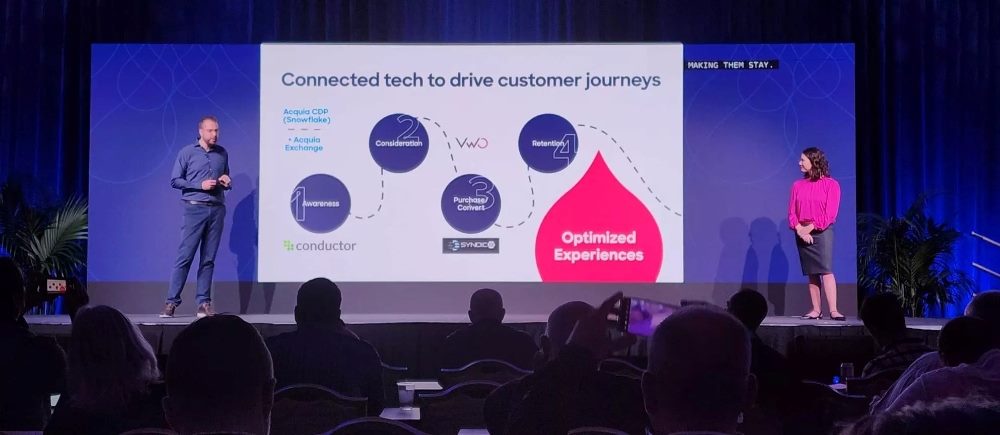The Gist
- Exploratory phase for AI in marketing. Marketing professionals are still in the early stages of exploring generative AI's potential, with many in an experimental phase, focusing on how to best integrate AI for personalization and big data analysis.
- Enhancing digital experience and personalization. There's a focus on using AI to enhance digital experiences, like through advanced search capabilities and personalized content, mirroring approaches by companies like Amazon.
- Strategic AI integration and education. The key to successful AI implementation lies in integrating it into familiar tools and interfaces, educating teams on its use, and developing AI-focused business strategies for increased efficiency and creativity.
EVERETT, Mass. — As assistant director of web services at Florida State University, Debbie Kelly is aware of the rising interest in AI in marketing and naturally wants to create excellent digital experiences for prospective and current students.
Find what they need. Feel like things are personalized. For her, that means developing experiences where things like integrations with marketing cloud software are seamless.
How has generative AI entered the mix? Not full-on quite yet, she says. Web teams are still in exploratory phases when it comes to AI in marketing. And she’s excited about the future.
“First I'd like to see something as simple as the search,” Kelly told CMSWire about potential generative AI integrations at the Acquia Engage conference at the Encore Casino this week. “So leave the site search as it is but add another search. So they could choose which one they want. And the other one would be a ChatGPT-similar search, just on our website. It’s going to find you the answer.”
She’d also like to see the personalization game upped a bit with AI. “You think about Amazon,” Kelly says. “And, they're using AI. But they're also using personalization, and putting the two together would really be where it's at.”
Generative AI in Marketing: Current Trends and Exploratory Approaches
Kelly’s thoughts represented a microcosm of the ideas and hopes around generative AI in marketing from digital customer experience and marketing leaders who attended the conference this week put on by the Boston-based digital experience software provider. Held in the casino and resort just outside of Boston, marketers just didn't seem ready to take a big gamble on generative AI integrations. They're dropping a few pennies in the generative AI slot machines then walking away and getting back to their customary marketing content and campaigns, it seems.
We didn’t hear tales of 180-degree-revamped marketing programs and strategies around generative AI. We didn’t hear demonstrated cases of massive ROI from generative AI marketing use cases. We didn’t hear tales of marketing team shake ups thanks to generative AI.
What did we hear? Practitioners are in the exploratory phase around generative AI in marketing, even if it’s been a year since the technology hit mainstream with the debut of OpenAI’s ChatGPT.
“We’ve seen our clients broadly using AI for personalization or big data analysis, but generally speaking, many haven’t fully adopted AI technologies yet,” said Brian Skowron, president of digital agency Lullabot. “This is especially true with our government and higher ed clients who typically take a wait-and-see approach to new technologies. That said, one of our clients who was previously the chief digital officer for the state of Georgia recently became Georgia’s chief digital & AI officer, which is definitely a step toward addressing AI at an organizational level.”
Related Article: Generative AI in Marketing: Smoothing Creative Operations
Generative AI’s Multimodal Capabilities and Their Impact on Marketing Strategies
These anecdotal tales of generative AI in marketing usage were confirmed by data during a keynote from Marketing Artificial Intelligence Institute founder and CEO Paul Roetzer. He shared that most survey respondents (45%) in his company’s 2023 marketing and generative AI report say they’re experimenting with generative AI.
“They're just trying to figure out what to do with it,” Roetzer said. “There's certainly a fair amount that is infused into their daily workflow. But the reality is that most people are still just trying to find the use cases and trying to find their personal use of it. Trying to find pilot projects within their companies. But that is going to change. And the primary reason that is going to change very quickly is that big tech is betting everything on artificial intelligence.”
Citing ChatGPT’s advancement to become multimodal — it can see things, speak and analyze images — Roetzer said, “This starts to give you a sense of what's going to happen in marketing.”
Roetzer illustrated how ChatGPT created a formula to predict how many fans were in the stands of a Cleveland Browns football game. “Not only can it see the image but it can understand what's in the image," he said. "You could do this right now in marketing.”
“You could give it website designs and ask it to assess it based on those principles,” Roetzer said. “... It can provide a narrative on charts and graphs. It can write photo captions for you. It can analyze buyer journey maps. It can analyze whiteboard sessions. Anything it can see it can analyze. And the kicker is it's not trained to do any of it. No one has gone in and specifically taught ChatGPT how to do any of these things, and yet it's capable of doing them. So we think about where this goes. Imagine actually further training a model on a specific use case.”
Roetzer cited the ability OpenAI gave marketers and others alike to build their own ChatGPTs, essentially, through its GPT model, announced at its developer conference earlier this month.
Related Article: OpenAI Launches GPT-4 Turbo, Pioneering New Era of Personalized AI
The Expanding Role of AI in Marketing: Ideation, Editing and Tone Setting
Deanna Ballew, SVP of DXP products at Acquia, observed that AI in marketing is increasingly used as an assistant for ideation, copy editing and establishing voice and tone. Ballew emphasized the growing importance of learning how to write effective prompts and the use of cheat sheets for prompt engineering.

Ballew noted, like Roetzer, that recent developments in AI technology (ChatGPT’s specifically) are making prompt engineering less necessary, potentially making the technology more accessible. However, at the time, she acknowledges ongoing concerns about copyright and licensing. She also highlighted the challenge of integrating AI tools into everyday work processes, as tools that are not readily accessible are often underused.
“Right now I see it being more used as an assistant,” Ballew said. “I think there's still hesitation around copyrights and licensing as there should be to see how that's going to take shape.”
Ballew noted that when AI tools are not a part of the marketer’s regular toolkit and requires them going to a different platform, they tend to be forgotten or overlooked. This leads to a challenge in adopting these tools: remembering to use them and figuring out when they are most applicable. For example, one might think of using ChatGPT for a specific task, but integrating such AI tools into daily routines is key. As these tools become more integrated into everyday tools, their usage is likely to increase. Roetzer showed a slide where Acquia does this with an OpenAI integration inside Drupal.
Regarding Acquia's implementation of AI in marketing, particularly in Drupal, Ballew pointed out that AI is used to assist with content creation, emphasizing the importance of easy access and a freemium model in encouraging adoption. She believes that the key to transforming marketing strategies with AI lies in changing human work habits, suggesting that integrating AI into familiar user interfaces, like search bars, could help in this transition.
“Using chat UX experiences is the direction that I think will start changing people's habits,” Ballew said, adding that as AI becomes more integrated into tools and provides more intuitive, conversational interactions, its adoption and impact on marketing strategies and workflows will significantly increase.
AI in Digital Marketing: An Inquisitive Phase With Emerging Opportunities
Pat Gilbert, senior director of strategic alliances at TA Digital, noted that the most common question from customers is about the practical applications of AI in digital marketing and what concerns they should have. Gilbert observed that the industry is currently in an inquisitive phase, exploring AI's potential rather than focusing solely on specific use case wins or return on investment.
Gilbert emphasizes that AI is still in its infancy, with some quick wins but overall in an early stage of development. The key idea is that AI can take over more tedious tasks, freeing up strategic marketers to focus on more critical initiatives. He highlights that AI can handle much of the analysis and interpretation of data from customer data platforms (CDPs), which is usually time-consuming for marketers.
“The idea is that AI can start to replace some of the more tedious tasks that a strategic marketer might not want to do or they spend way too much time doing to get the value out of it,” Gilbert said. “It can take over a lot of that workload, to allow those marketers more time to actually spend on strategic and creative initiatives that they should be working on.”
When asked about specific use cases they are leaning toward as an agency, Gilbert said leveraging large amounts of marketplace data for predictive analysis and modeling, particularly around customer buying propensity. Their approach involves using their commerce solution and AI to create more personalized experiences for unknown customers, based on limited data points such as location. The goal is to build segmentation and make assumptions about customers, with AI learning and adapting as it gathers more data from customer engagement. This approach aims for more reactive and personalized customer interactions than a human could achieve.
Related Article: AI Customer Experience: Not Quite Ready for a Solo
Where Do Marketers Go With AI From Here?
Roetzer emphasizes the need for businesses to evolve into AI-focused or AI-enhanced entities to become smarter and more efficient across all sectors, not limited to marketing. This transformation involves enhancing various business functions like finance, legal and sales through AI to boost efficiency, creativity and decision-making.
He underscores the importance of educating staff about AI in marketing to mitigate uncertainty and anxiety about its impact on their future. Roetzer recommends forming an AI Council to spearhead this initiative, starting with those who are eager to learn and contribute. The council should develop foundational principles and policies and assess AI's impact on various roles, considering the potential for re-skilling and up-skilling in preparation for future job demands.
He also advises creating a strategic AI roadmap to prioritize use cases and projects. Reflecting on the broader implications of AI, Roetzer said he's excited about the potential for scientific discovery and the emergence of new career paths. He envisions a creative renaissance and democratized access to AI tools, leading to enhanced productivity and efficiency in companies.
However, he advocates for a balanced approach, suggesting that companies could choose to use AI-generated efficiencies for positive outcomes like spending more time with family, thereby making the future not only more intelligent but also more humane.
"That's what I want for our team," he said. "So as a company, I'll make a choice to give some of that back. To create more time as a result. Because I believe the future can be more intelligent, no doubt, but I also believe if we choose, it can be more human."
